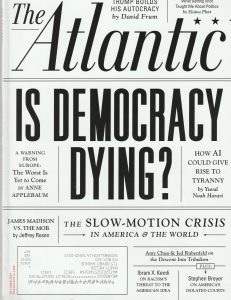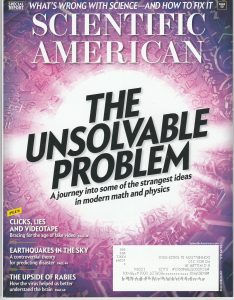The city of Sandusky, Ohio, population 26,000, has swapped out Columbus Day for Election Day and declared it a paid holiday. Thus far, only 250 city employees are affected — “But we’re very hopeful that the message that it sends will be contagious,” the city manager said. [NPR]
-> Mariner notes in passing such a small adjustment to American culture. He remembers Columbus Day being a big deal which brought a few days of holiday spirit and even a few parades. On the other hand, democracy shows signs of rumbling from its grave, insisting voting is more important than Chris.
– – – –
OMAR IN HOT WATER — Freshman Rep. Ilhan Omar is under fire for a recent tweet seen by some as anti-Semitic. The Minnesota Democrat, one of the first two Muslim women elected to Congress, suggested Sunday night that Republican support for Israel is fueled by campaign donations from Jewish lobbying groups. While Omar has been repeatedly attacked by the GOP for her critical views toward Israel, her latest remarks earned rebukes from members of her own party. “Congresswoman Omar’s statements are deeply hurtful to Jews, including myself,” said freshman Rep. Max Rose (D-N.Y.). [Politico]
-> Three cheers for diversity. God bless the New Bunch (freshman Representatives). The Muslims have been on the spot for decades; now the Jews. Let’s throw in the Mormons, Roman Catholics, Evangelicals, Native Americans and while we’re at it, the Zen crowd, too. The schisms and protectionist behavior between these groups have lasted far too long. What is the common thread of humanity among them? As for Jewish politics, well, politics is politics; money is a religion, too.
– – – –
Few species live past the point they can produce offspring. Why do humans?
Anthropologists have had reasons to suspect that a mother’s help allowed their daughters to have more children. New research into 17th century genealogical records backs that up, showing that a grandmother who lived close by allowed a mother to start having kids sooner, reduced child mortality, and resulted on average in 1.75 more children. But another study found those benefits only existed if the grandmother was young enough to help out.[1] [NPR]
-> Monkeys around the world have known this all along. The role of family matriarch is an important role in simian colonies. Mariner makes note of this because it is another indicator that worldwide human reproduction is undergoing a change. Not because grandmothers are too old – well, maybe, as actuary tables creep into the 80’s – but for some reason every modern, industrialized nation is suffering from a lack of citizen replacement. A report from the United Nations says:
“Population ageing is poised to become one of the most significant social transformations of the twenty-first century, with implications for nearly all sectors of society, including labour and financial markets, the demand for goods and services, such as housing, transportation and social protection, as well as family structures and intergenerational ties.
“According to data from World Population Prospects: the 2017 Revision, the number of older persons — those aged 60 years or over — is expected to more than double by 2050 and to more than triple by 2100, rising from 962 million globally in 2017 to 2.1 billion in 2050 and 3.1 billion in 2100. Globally, population aged 60 or over is growing faster than all younger age groups.”
Mariner continues to stumble over bits of information that are related to an increasing ratio of senior citizens to younger ages. For example, the Calhoun studies with overpopulated mice showed that reproductive ability in the females failed as the mouse society began to crumble; the issue of excessive numbers of humans which disrupts the environmental balance of the planet is another area; continuous articles about the financial support for the elderly because of fewer taxes from younger generations, and even the collapse of day-to-day life in Japan.
Japanese childbearing is currently estimated to be nearly 35 % below replacement level. According United Nations Population Statistics estimates, these demographic trends will drive Japan’s total population down from 127 million to 114 million by 2030 – a level affecting economic stability.
Sex ratio at birth has declined significantly in Japan and in U.S. whites, but not for African Americans, for whom sex ratio remains significantly lower than that of whites. The male proportion of fetal death has increased overall in Japan and in the United States.
Here’s a note for Donald’s Base: If current trends continue, the population of the United States will rise to 438 million in 2050, from 296 million in 2005, and 82% of the increase will be due to immigrants arriving from 2005 to 2050 and their U.S.-born descendants, according to new projections developed by the Pew Research Center. Unfortunately, Japan will not benefit from immigration and faces critical economic issues by 2050.
– – – –
Guns in America, through the eyes of the next generation.
A year ago, a gunman killed 17 people at Marjory Stoneman Douglas High School in Parkland, Fla. Afterward, students at that school set off an unprecedented wave of youth activism for gun control — and eventually against it as well. NPR interviewed teens across the country to document their relationship with guns — including sport shooters, aspiring soldiers, gun control activists, those who’ve lost loved ones to gun violence and those who live with the threat of it every day.
What emerged were portraits of the budding political consciousness of the next generation, and of America’s complex relationship with firearms.[2] [NPR]
-> Mariner wishes the New Bunch well. They have their hands full – guns are a religion, too.
Ancient Mariner
[1] Read more at http://click.et.npr.org/?qs=3bb04c48d17980f1972efdceec6ec1537d4d4e3ab45bb9a862a531c7dfa237876a73f7abd948a02320f46b7955fd8fd6f61d69902f4ebf7a
[2] For more see: http://click.et.npr.org/?qs=3bb04c48d17980f1a39e73822fcf25413dd2313a7e25c0c3fd75f7abdfc31b2b11dcc11e26a733603b3af38b925bd27af45381a5576a42b6

 3-credit course on the subject. An excellent example of this pattern is the October 2018 issue. The cover headline asks, “Is Democracy Dying?” Nine articles are referenced right on the cover that provides an excellent base for understanding the turmoil of contemporary society, politics and governance.
3-credit course on the subject. An excellent example of this pattern is the October 2018 issue. The cover headline asks, “Is Democracy Dying?” Nine articles are referenced right on the cover that provides an excellent base for understanding the turmoil of contemporary society, politics and governance.
 Scientific American, are widely read. Over time mariner has chosen Scientific American Magazine (SA) because it is totally comprehensive in its range of science and technology and at the same time provides reader-friendly articles and references. Every edition has an endless insight into diverse – and often surprisingly humanistic – branches of science that enrich the reader’s familiarity with science.
Scientific American, are widely read. Over time mariner has chosen Scientific American Magazine (SA) because it is totally comprehensive in its range of science and technology and at the same time provides reader-friendly articles and references. Every edition has an endless insight into diverse – and often surprisingly humanistic – branches of science that enrich the reader’s familiarity with science.